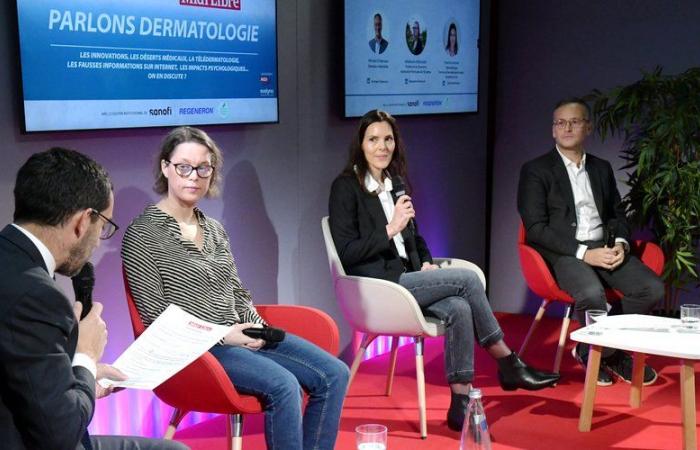The Midi Libre Health Lab, with the institutional support of Sanofi & Regeneron and the French Eczema Association, looked into the multiple questions surrounding dermatology on Wednesday. And since skin diseases affect millions of French people, there was no shortage of topics during this round table organized at the Midi Libre headquarters in Saint-Jean-de-Védas.
Today, 16 million French people suffer from one of the 6,500 skin diseases identified by the French Society of Dermatology. A majority of French people say they are concerned about protecting their skin care.
“For example, eczema affects two thirds of women and a third of men, introduces Stéphanie Merhand, founder and director of the French Eczema Association. Skin diseases are a big problem. This is also the case for access to dermatologists. You need to know how to take care of your skin throughout your life. Skin diseases are often evident. Since 2018, new treatments have existed to treat eczema, also called atopic dermatitis, we see that patients are returning to the care pathway.”
Charlotte Pernet, dermatologist at the Eureka dermatology center in Castelnau-le-Lez (Hérault), notes an awareness among the population: “For a long time, we thought that there was nothing to be done about certain skin diseases. They affect the entire population, from babies to the elderly, both men and women. It is necessary to contact a specialist as soon as the skin problem poses a concern for the patient. You must first consult your general practitioner who can resolve the problem or refer you to a dermatologist.
As with acne in teenagers. “A very common disease, notes Charlotte Pernet. It affects approximately 60% of adolescents and 40% of adults. Minimal acne is physiological, it is part of the development of puberty. The dermatologist treats more severe acne that resists initial treatments.”
The difficulty of making an appointment with a dermatologist
One of the main problems with skin diseases in France concerns the long delays in obtaining an appointment with a dermatologist. Thus, 73% of French people consider it difficult to access dermatologists. It takes, on average, three months to get an appointment with specialists. Around 46% of patients gave up on having a skin problem treated. “The number of dermatologists is decreasing, underlines Stéphanie Merhand. There are 3,000 in the region, the average age is 58 years. The specialty is in danger. In Occitanie, three departments do not have a dermatologist.”
A solution to compensate for this lack is found in tele-expertise, a system put in place two years ago at the Eureka Dermatology Center in Castelnau-le-Lez. “This is a method which allows the general practitioner to seek advice from a specialist, explains Charlotte Pernet. This lends itself well to dermatology because you can send us photos, the clinical history, the evolution of the disease, etc. We then respond via photo, without seeing the patient initially. Either we can resolve the problem, or, in 30% of cases, we need to see the patient. So we commit to freeing ourselves from emergency slots during the day, week or month. The results are positive, general practitioners are very satisfied with this method of consultation. And we have the impression that we are not missing out on potentially serious cases.”
Innovations and prevention at the center of the subject
Over the past ten years, there have been major innovations in dermatology based on the fact that specialists have better understood the immune mechanisms of the inflammatory response. These treatments for chronic diseases are essentially based on biotherapies, treatments that modulate the immune response and block an inflammatory pathway to limit flare-ups.
“We are also experiencing great therapeutic progress in melanoma with the arrival of targeted therapies which block cancer cells but also immunotherapy in melanoma which stimulates the immune response, develops Charlotte Pernet. All of this has completely changed the management of these pathologies.”
Beyond innovations, prevention is a key subject to counter the arrival of certain skin diseases. “We can talk about the prevention and screening of skin cancers, it is important that this education is done from a very young age, estimates Michael Chekroun, director of MedVallée, the global center of excellence in global health in Montpellier. There is the role of parents but also that of the school which can raise awareness about the use of sunscreen or protective clothing. I note the therapeutic progress but there is a need for prevention, knowledge of good practices in terms of hygiene and dietetics. With regard to chronic illnesses, beyond treatment, education on patient support is required. Eczema and psoriasis are visible diseases that can have an impact on patients’ daily lives from a very young age.”
The importance of good care
The shortage of dermatologists means that patients are tempted to find solutions elsewhere, whether on the Internet or in the memories of grandmother’s remedies. From the moment a redness, spot or lesion on the skin is detected, it is important not to self-medicate but rather to contact a specialist. “We absolutely must fight against this and trust the professionals, says dermatologist Charlotte Pernet. When it comes to atopic dermatitis, the important thing is to hydrate your skin with emollients.”
“Social networks don’t always help even if positive things are happeningadds Stéphanie Merhand. Skins are so different that we cannot have a single solution for everyone. But some patient testimonies give hope and can help isolated people.”






